|
75 Castle Street
 and 6 Church Street and 6 Church Street
  
Also mentioned as 19 Church Street
Dover
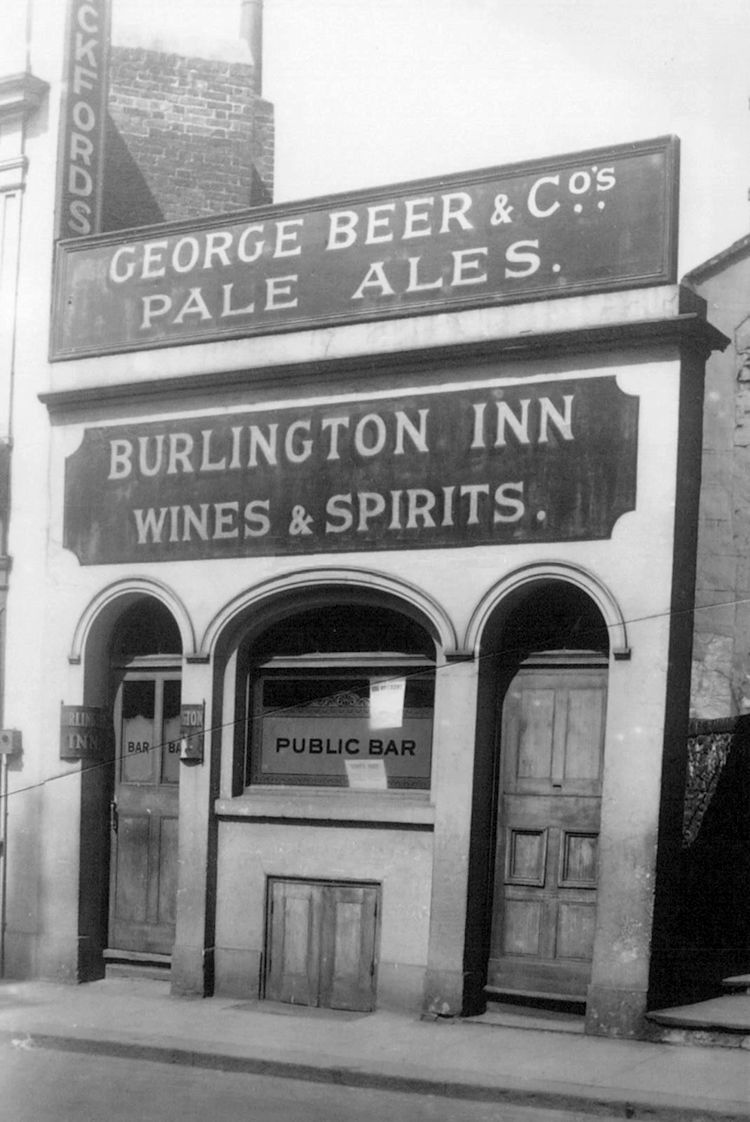
Above photo circa 1924, kindly sent by Rory Kehoe. Until 1922, the
Burlington was one of about 50 pubs in Dover which were tied to George
Beer's Star Brewery, Canterbury. After George Beer's January 1922 merger
with W E & J Rigden, their combined estate of about 250 tied houses was
owned and supplied by George Beer & Rigden's Brewery, Faversham. This
photograph is almost certainly one of the series commissioned by George
Beer & Rigden showcasing all their pubs in their new livery and signage. |
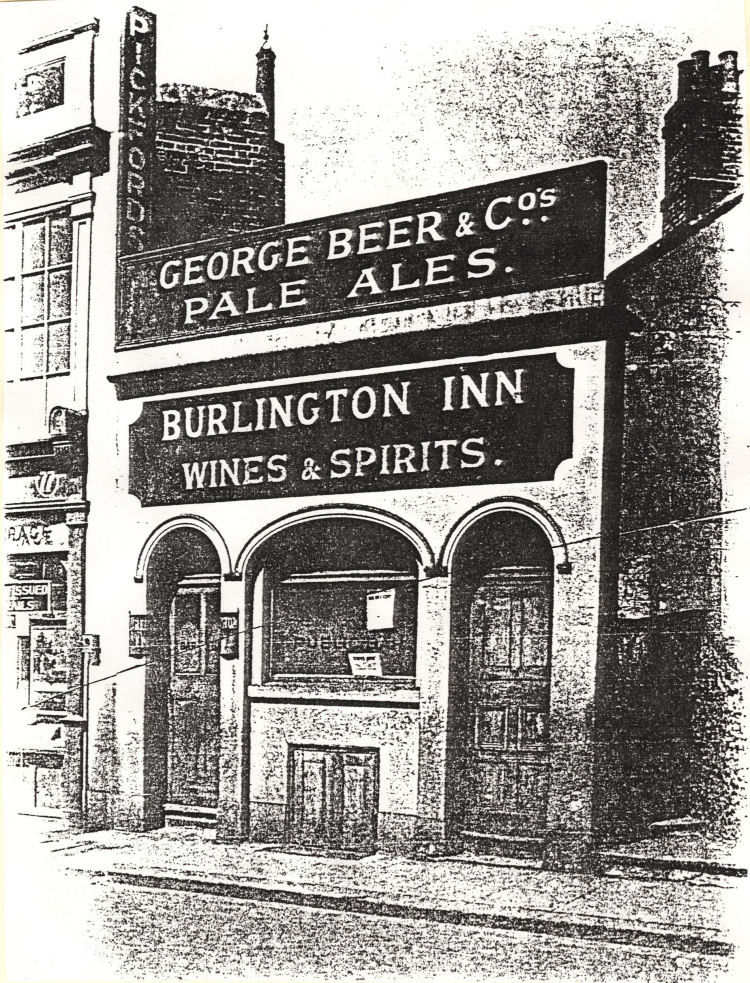
Same photo as above circa 1924, but showing a little more of the
building. |
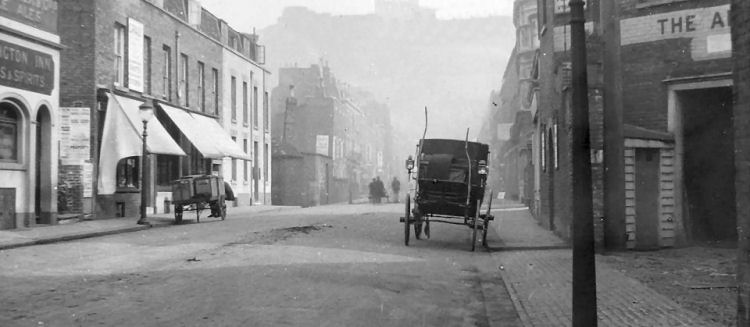
Above photo showing the "Burlington Inn" circa 1900. |
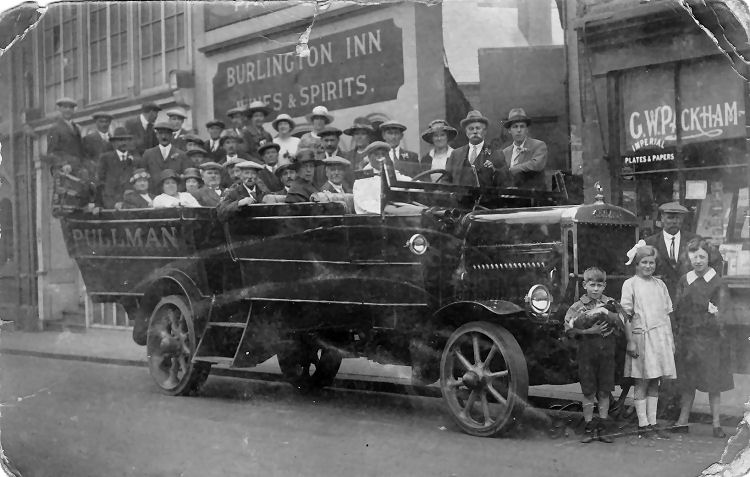
Above photo kindly sent by David Kirk, who says:- This is a photo taken
outside the "Burlington Inn," Dover, date unknown, but probably in the
1920's. I believe the party were going on a day trip, almost certainly
all regular drinkers at the "Burlington" as my grandfather Fredrick John
Kirk is one of them sitting in the vehicle. |
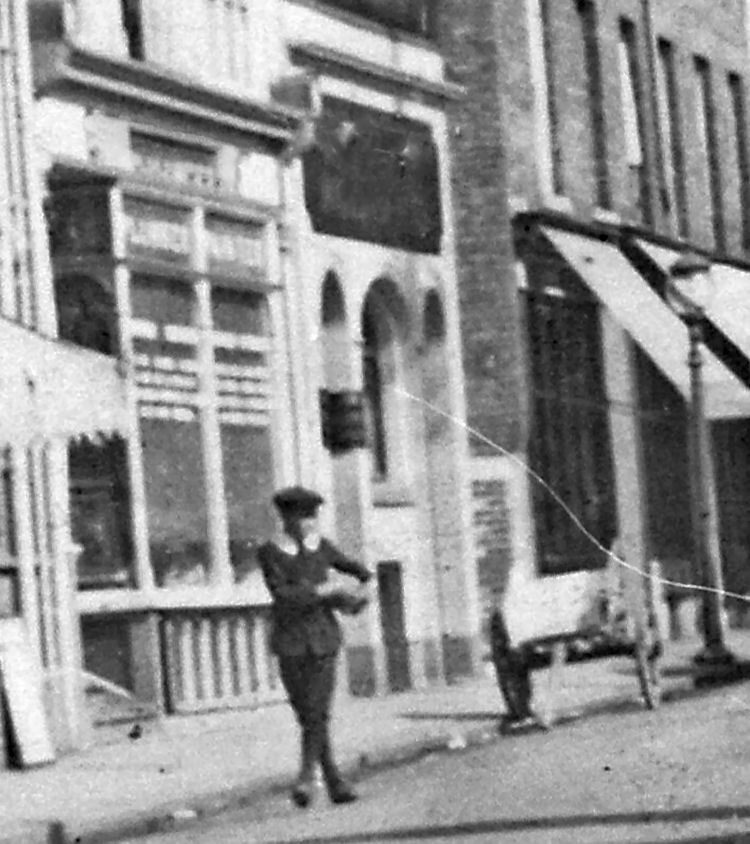
Above photo, circa 1900, kindly sent by Paul Wells. |
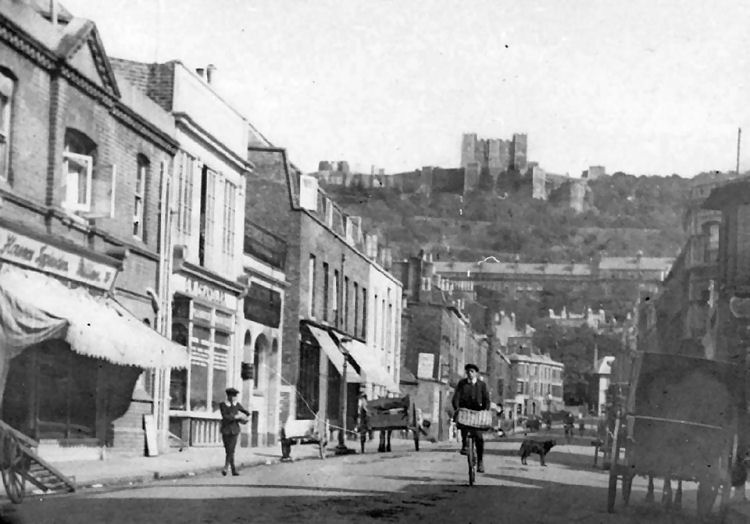
Above showing the whole photo from above. |
An old one this, adopting the standard of inn when the
spirit licence was granted in 1842. The bars could be utilised from the two
streets and thus two publicans were involved during part of its history
 . .
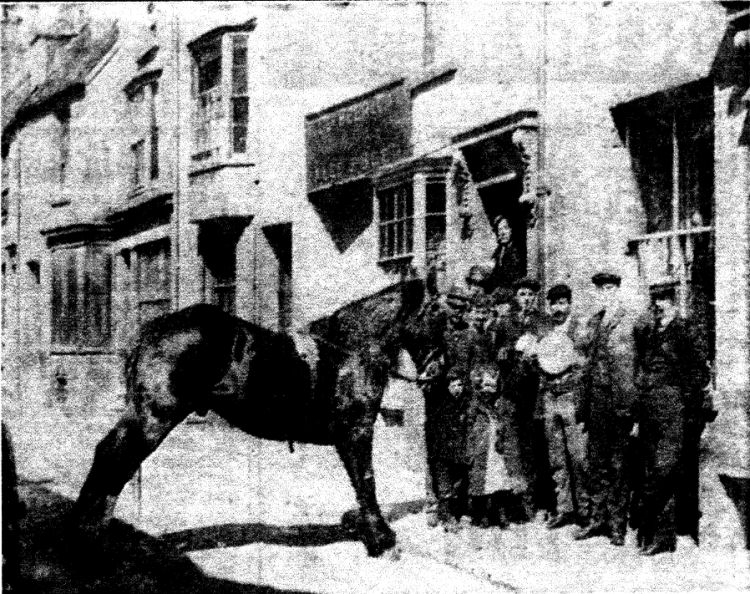 |
|
Customers (yes, and the horse) outside one of the
public houses of yesteryear. This was the Burlington Inn - of which
there used to be two - in Church Street. Taken about 1900 the picture
shows the inn flanked by a number of business premises including those
of Webb the saddler, harness and collar maker.
|
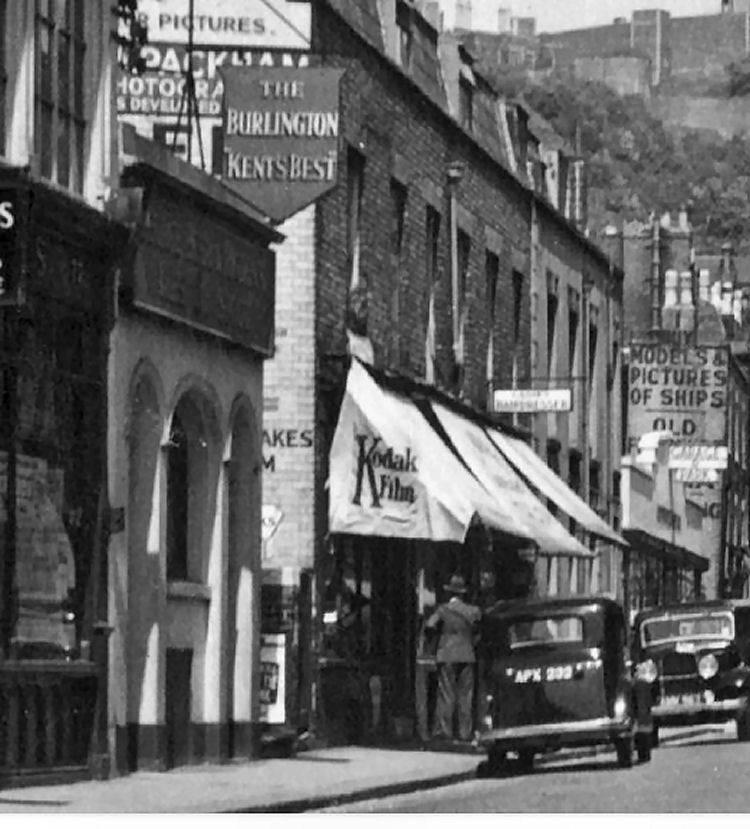
Above picture showing the Castle Street entrance of the Burlington Inn.
Date circa 1930.
|
|
From the Dover Express and East Kent News, 10 July, 1936.
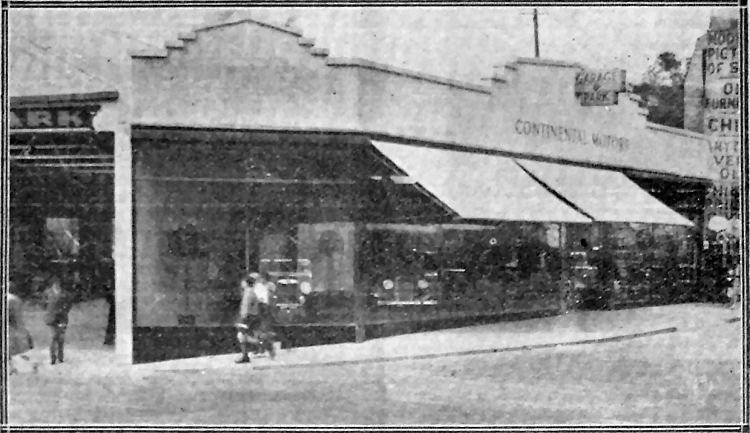
Above picture showing the New Motor Show Rooms and Garage
for Continental Motors, built on the site of the old Tanyard, at the
junction of Castle Street and Stembrook, and opened last week-end.
|
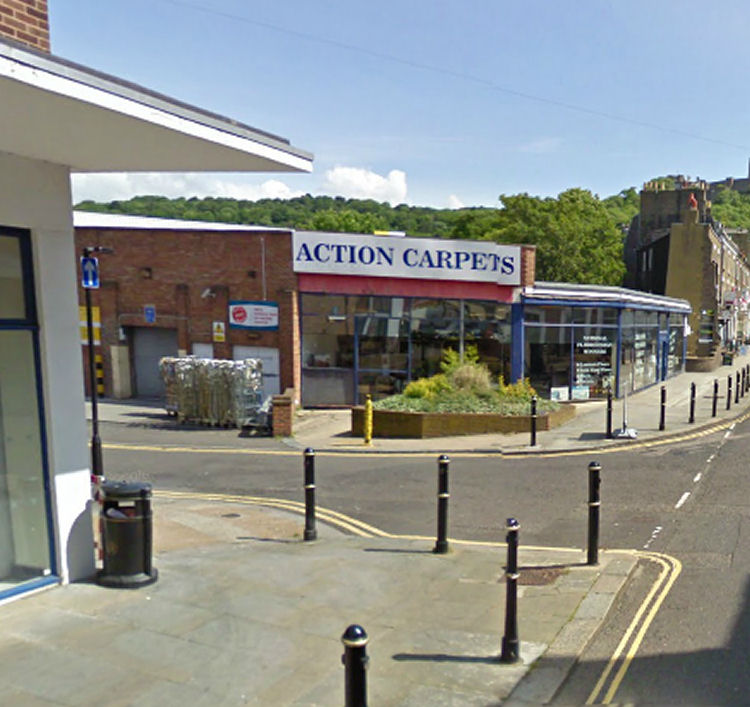
The shot above taken from Google maps June 2009 shows the
same position of shot as the picture above.
|
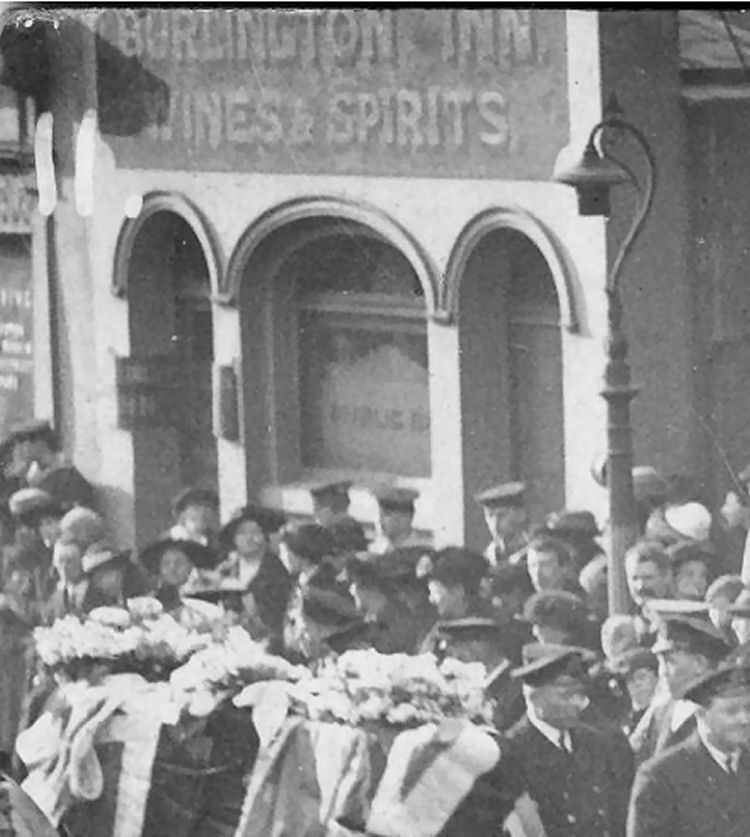
Above pictures kindly supplies by Paul Wells who says he is yet to
identify the funeral cortege.
|
It was there under that name in the year 1846, having been
sold at that time under an order of the Court of Cancery. That same year the
Dover Telegraph reported on 19 December that licensee Mr S Forth - notice of
birth of a son.
In 1872 an interesting proposition was put to the Bench by
Mr. Joyce. He suggested that his licence at the "Rose and Shamrock" be
transferred here. If not at that particular time, it would seem his wishes
were eventually gratified because he shows as the patron in 1874.
This establishment spent much of its life out of bounds to
troops. Not for its misdemeanours I hasten to add. The civil and military
authorities found the premises difficult to supervise.
It was referred to the Compensation Authority in 1939
which may have meant curtains. I've no knowledge. If it was still present
then, its removal could have been early in 1945 when demolition did affect
that area.
At the close it would have been the property of George
Beer and Rigden.
|
From the Dover Telegraph and Cinque Ports General
Advertiser, Saturday 16 July, 1842. Price 5d.
DOVER POLICE REPORT
Samuel Forth, charged with keeping his house open beyond the hours
allowed. Defendant stated that the door was closed at eleven o'clock,
but as it rained very hard, he allowed two of his friends to remain for
shelter. It being proved that his house was well conducted, the case was
dismissed, upon payment of 6s. costs.
|
|
From the Dover Telegraph and Cinque Ports General
Advertiser, Saturday 2 February, 1848. Price 5d.
SAMUEL FORTH v. WILLIAM REYNOLDS
A claim of 14s. for beer.
Plaintiff stated that defendant, who sailed in one of his fishing
smacks, had run up the above score at the time he kept the "Burlington"
public-house. The defence set up was that plaintiff owed defendant more
than the sum now claimed for fish and making mats. His honour said that
not having pleaded a set off, he could not now do so, and must summons
plaintiff if any sum was due to him; and gave judgement for the amount
to be paid in two months.
|
|
From the Kentish Gazette, 24 January 1865.
Coroner’s Inquest.
On Saturday afternoon the Borough Coroner, W. H. Payn, Esq., held un
inquest at the "Union Tavern," on the body of Stephen Tuff, a
gardener, belonging to Canterbury, whose body had been picked up in
the fairway of the channel on the previous morning. From the
evidence of the unfortunate deceased’s widow, who said she lived in
Rosemary-lane, Canterbury, and recognised the body as that of her
late husband, it appeared that he left Canterbury a few days before
Christmas, — on Tuesday, Dec. 20, to spend a day or two with a
friend living at Dover, Mr. R. Head, the landlord of the "Burlington
Inn." He then had with him a silver watch and guard and 10s., or a
little more, in money. He reached the "Burlington" the same day, and
remained, chatting with Mr. Head, till about eight in the evening,
when he left the house, without saying where he was going. He was
sober, and Mr. Head fully expected him to return, sitting up for him
till after midnight. From that time, however, all trace of him was
lost till the previous day, when his body was found floating as
described. Neither watch nor money was to be found upon him; but a
pair of spectacles, which be had with him, was in his pocket. The
body bore no marks of violence, although there were some abrasions
of the skin on either side of the head, apparently caused by the
body chafing in the water. The opinions of the witnesses differed as
to the length of time the deceased had been in the sea, but the
policeman who had examined it considered that it must have been in
the water for least three weeks. The watch had not been traced. The
latter fact, coupled with the mark on the temples, inclined the
foreman of the jury to further investigation; but the coroner
observed that if an open verdict was returned the inquiry might, if
necessary, be opened, should the police find trace of the watch, and
connect it with any circumstances calculated to cause a suspicion of
foul play, and the jury then returned a verdict to the following
effect that the deceased was found floating in the water, but by
what means he came to his death there is no evidence to show."
|
|
From the Southeastern Gazette, 17 July 1866.
THE BANKRUPTCY ACT, 1861.
WILLIAM COOK, formerly of the “Burlington Inn,” Church-street, in the
town of Dover, in the county of Kent, innkeeper and plumber, then and
now of No. 1, Church-place, in the town of Dover aforesaid, journeyman
plumber, having been adjudged bankrupt in the County Court of Kent
holden at Dover on the tenth day of July, 1866, is hereby required to
surrender himself to Robert Green how, Esq., the Registrar of the County
Court of Kent holden at Dover, at the first Meeting of Creditors, to be
held on the 28th day of July, 1866, at 12 o’clock at noon precisely, at
the County Court Office, Snargate-street, Dover aforesaid.
John Minter, Esq., is the solicitor acting in the bankruptsy.
At the meeting the Registrar will receive the proofs of the debts of the
creditors, and the creditors may choose an assignee or assignees of the
bankrupt’s estate and effects. All persons having in their possession
any of the effects of the said bankrupt must deliver them to the
Registrar, and all debts due to the bankrupt must be paid to the
Registrar.
THOS. BOWLING, High Bailiff.
|
|
From the Dover Express. 1870.
Excise Information - Heavy Penalty.
Robert Head the landlord of the Burlington Inn, was charged with an
infringement of the customs act by selling Cavendish tobacco that had
neither been warehoused by the customs, nor provided by the customs with
the necessary customs wrapper. Mr. Fox for the defendant admitted the
charge and the penalty were reduced to one fourth for each offence, £30
in all, which he paid.
Information kindly supplied by Joyce Banks.
|
|
From the Dover Express and East Kent Intelligencer, 26
August, 1870. Price 1d.
EXCISE INFORMATION - HEAVY PENALTY
Robert Head, landlord of the "Burlington Inn" was charged with an
infringement of the Customs Act by selling Cavendish tobacco which had
neither been warehoused by the customs nor provided by the customs with
the necessary customs wrapper.
Mr. Fox for the defendant, admitted the charge and the penalty was
reduced to one-fourth for each offence - £30 in all, which was paid.
|
|
From the Dover Express and East Kent News, Friday, 6 September, 1874. Price 1d.
ANNUAL LICENSING MEETING
A complaint against the landlord, Joyce, was preferred by Inspector
Coffee, appointed to the Dover District under the Contagious Diseases
Acts. Police-constable Hooper was employed to watch a clandestine
prostitute near defendant's house, and one evening Joyce ran out and
loaded him with abuse, exclaiming “Look out for the bougie-man. Bring
out my magic lantern that I may have a look at him.” This, the Inspector
said, would have caused a breach of the peace had it been addressed to
any but a Police-constable. (A laugh.)
Mr. Mowll said he was instructed on the part of defendant to express to
the Bench his deep regret at what had occurred. He believed, rightly or
wrongly, that his house had been for some time, to use an expressive
phrase, a spotted one, and that Hooper had persistently stopped outside
and watched it, for one evening he came into the house and peeped
through the glass door at the people in the bar. No doubt Joyce was not
justified in doing what he did, and the fact of his being an Irishman
might be an excuse for what he had done. (Laughter.) He had been in
Dover for some years, and was well-known as a well-conducted licensed
victualler, and had kept the “Burlington” better than any former tenant.
Mr. Williams, of 18, Church Street, next-door to defendant, said the
house was well and respectably kept.
Dr. Astley said the Bench would pass over the matter now, but it must
not occur again. The duties of an Officer such as Hooper were by no
means pleasant, and defendant ought rather to have assisted than
attempted to obstruct him.
|
|
From the Dover Express and East Kent News, Friday 27 April, 1877.
A TRAMP AND HIS TRACTS
Dann Banks, was charged with begging at the “Burlington Inn,” Castle
Street.
William Richmond, Anti-Mendicity Agent, said: He saw the prisoner about
ten minutes past eight on Sunday evening, at the door of the “Burlington
Inn,” in Castle Street, for the purpose of begging. He went over to him
and saw him receive a copper piece from those who were in the bar. The
man had a small bundle of tracts with him.
Prisoner said he sold some of his tracts there but did not beg. One of
the men gave him a penny and would not take a tract.
Mr. Superintendent Sanders produced a hawker's certificate which the
prisoner held and said it was a usual thing for men of the prisoner's
class to take out those sort of licenses. They go begging and directly a
Police Officer comes along the men produce their tracts.
The few tracts found upon the prisoner were handed to the Bench with one
or two songs, which he said he had in his possession about six months.
Mr. Jones said he supposed the songs were to sell on week days and the
tracts on Sunday.
The prisoner went to gaol for seven days with hard labour.
(A tract being a literary work usually religious in nature. Today they
would be referred to as pamphlets. Paul Skelton)
|
|
Dover Express, Friday 28 November 1902.
DEATH OF A CAB DRIVER.
An inquest was held at the "Orange Tree Inn," Maxton, by the Borough
Coroner (Sydenham Payn, Esq.), on the body of a man named George Cadey,
who was found dead in his bed at Henley Cottage on Sunday morning. Mr.
F. Sankey was the foreman of the jury, and the following evidence was
given.
William Curling said:- I live at Henley Cottage. Deceased lived there
and had been a fly driver. He was 74 years of age. He had always had
good health, and had never had a doctor except when he injured his leg.
On Saturday night deceased did not go out except to fetch some beer for
supper. His health was then as good as ever. He had supper, which
consisted merely of bread and cheese and beer, at 10 p.m. His wife went
to bed first and he went about 10.45. I heard a noise at night which I
thought was coughing. I did not think anything was the matter. About 4
o’clock I was called to come as quickly as I could. I went, and
deceased’s wife said to me, "I'm afraid father is dead." He looked quite
dead and was quite cold. The bed clothes were in order. I fetched Mr.
Wood. Deceased's wife told me that she heard him moan three times during
the night. Later on she thought he seemed to lay rather quiet, and she
felt him and found he was cold.
Mr. C. Wood, surgeon, said:- I was called to Henley Cottage about 5.45 on
Sunday morning, and in the upper room I saw deceased lying on the bed
dead. He was lying on the right side and his arms were on his chest in a
natural position. He had been dead three or four hours at least. I had
never attended him before. I examined him and found no marks of injury.
My opinion is that he died from heart failure.
The jury returned a verdict in accordance with the medical evidence.
|
|
From the Dover Express and East Kent News, Friday, 20 May, 1904. Price 1d.
LICENSING MATTERS
An extension was granted to the “Burlington Hotel” till 2 a.m. on
Wednesday morning for a dance.
|
|
From the Dover Express and East Kent News, Friday, 5 August, 1904. Price 1d.
EXTENSION
The Secretary of the “Burlington Hotel” applied for an extension of time
for a dance until 2 o'clock on Wednesday morning, and it was granted.
|
|
From the Dover Express and East Kent News, Friday 18 January, 1907. Price 1d.
LICENSING BUSINESS
The management of the “Burlington Hotel” was granted an extension of
time for Thursday 17th January, for the house dance.
|
|
From the Dover Express and East Kent News, Friday, 5
April, 1907. Price 1d.
EXTENSION
The "Hotel Burlington" was granted an extension till two o'clock on
Friday night on the occasion of a dance.
|
|
From the Dover Express and East Kent News, 6 January 1911.
LICENSING BUSINESS
At the DOVER Police Court this morning, before Captain R. B. Cay, R.N
(in the chain) and E. Chitty, Esq. the management of the Hotel
Burlington was granted an extension till 12.30 on Friday next on the
occasion of a private dance given by Major Heyman.
|
|
From the Dover Express and East Kent News, Friday, 19
January, 1912.
EXTENSIONS
The management of the "Hotel Burlington" were granted an extension
till 2 a.m. for a ball on the 19th January.
|
|
From the Dover Express and East Kent News, Friday, 25 December, 1914. Price 1d.
DRUNK AND DISORDERLY
At the Dover police Court on Monday, before Mr. J. H. Back (in the
chair), Dr. C. Wood, and Mr. A. Clark.
Frederick Odell was charged with having been drunk and disorderly in
Castle Street.
Police Constable Husk stated that on Saturday afternoon, about 3.30, he
was called to the “Burlington Inn,” Castle Street, and going there in
company with Detective Sergeant Southey, he found the prisoner, with
several others, creating a disturbance. They were ejected. Prisoner was
drunk, and used obscene language outside, and refused to go away.
Witness took him into custody, and took him to the Police Station. He
went fairly quietly.
The Chief Constable stated that defendant had been at the Police Station
for various offences, principally for assault and poaching.
A fine of 10s. was imposed, and a week allowed for payment.
George Albert Hobbs was charged with having been drunk and disorderly in
Princes Street.
Police Constable Kingsmill stated that on Saturday evening, at 7.25, he
was on duty in York Street, and his attention was called to a crowd in
Princes Street, and on going there he found defendant and a woman he was
living with having an altercation in the street. Defendant was using
most filthy language. Witness could not get defendant to go away. He was
drunk, and fell down, and refused to move. Witness took him into
custody, and took him to the Police Station.
A fine of 10s. was imposed.
|
|
From the Dover Express and East Kent News. 21 January, 1921.
LICENSING BUSINESS
The "Hotel Burlington" was granted an extension for a dance on
Wednesday evening, arranged by Mrs. Clark.
|
|
From the Dover Express and East Kent News, Friday, 13
January, 1922.
LICENSING BUSINESS
The license of the "King's Head,"
Kingsdown, was temporarily transferred from Mr. Leonard Thomas Patterson
to Mr. Albert Joseph Gifford, late of the "Prince of Wales," Ware, Ash
(now closed). The last transfer was in 1900.
Alderman Lewis (to Mr. Patterson): Made your pile, of course.
(Laughter.)
|
|
From the Dover Express and East Kent News, Friday, 14
April, 1922.
LICENSING BUSINESS
The management of the "Burlington Hotel" was granted the following
extensions; April 8th, dance for Mr. Mitchell; 11th, Dover Marine Sports
Club dinner; 21st, West Street Harriers' annual ball; and 26th, Military
Jubilee Lodge of Freemason's dinner. The application for the West Street
Harriers' ball was until 2 a.m. for liquor and 3 a.m. for dancing.
Alderman Chitty said that he would like to know from the Chief
Constable whether there was any reason why they should grant this?
Chief Constable Green said that there was supper at midnight, and
many well-known county people were coming.
Alderman Chitty: Do you think it conducive to their good to be
drinking all through the night?
Chief Constable Green: I do not know about conducive.
Mr. Brett said that they should not put such a question on to their
Chief Constable, but make up their own minds.
Mr. Newman, manager of the hotel, said that the Earl of Guilford
would be present, and many of the guests would be staying at the Hotel.
The Bench granted the extension of hours asked for.
|
|
From the Dover Express and East Kent News, Friday, 18
August, 1922.
LICENSING BUSINESS
The management of the "Hotel Burlington" applied for an extension to
sell intoxicating liquor until 1.30 a.m. on Saturday, August 19th, on
the occasion of a dance to be held on August 18th, the bar to be closed
to the public.
The application was granted.
|
|
From the Dover Express and East Kent News, Friday 13
April, 1923. Price 1½d.
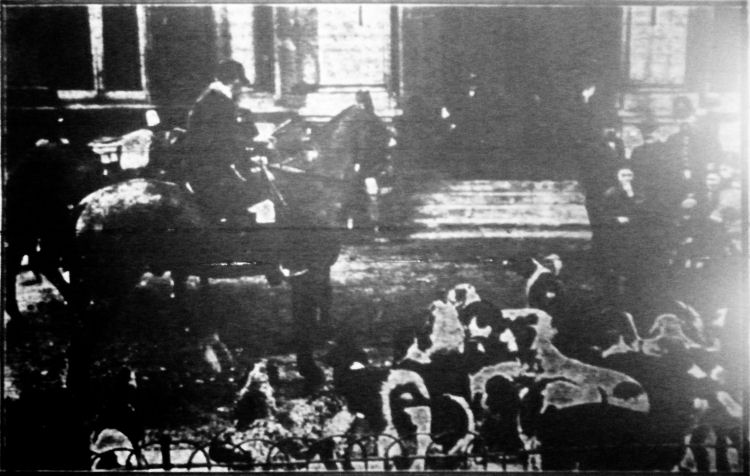
The meet of the West Street Harriers at the "Burlington
Hotel" on Saturday. Followed by the hunt ball.
|
|
From the Dover Express and East Kent News, Friday 6 February, 1925. Price 1½d.
THE BURLINGTON INN CASE
William Henry Coles, manager of the “Burlington Inn,” Church Street, now
living at 16, Bartholomew Street, was summoned for knowingly harbouring
un-Customed goods, spirits, whereby he forfeited the sum of £304 5s.
6d., treble value and duty.
Mr. De Wet appeared for the defendant and pleaded not guilty, although
he said he might later on alter that as to part of the summons.
Mr. Booth said that as a result of what happened the previous day, the
“Burlington Inn,” was visited. The search revealed 55 bottles and a jar
of rum, 102 bottles and one jar of brandy, 48 bottles of whisky, two
bottles of Geneva, and 19 bottles of gin, 228 bottles in all and two
jars, that the defendant could not account for except ten bottles of
Booth's gin, for which he said he would produce an invoice, but did not.
Defendant refused to give any information as to whom he had obtained the
goods from. He had been caught and would have to put up with it, as he
was not going to give anyone away.
Mr. Warne said that he visited the defendant on November 9th at the
“Burlington Inn” and saw him. He asked if he would produce any un-Customed
goods on the premises. He said he had none and could not account for.
Witness inspected his books and proceeded to search the premises,
commencing at the bar and then going to the cellar beneath, where he
found a considerable quantity of spirits which were not accounted for by
any permit or document. After the search of the cellar and whilst
packing the goods in crates, the defendant stated to him that he could
not account for the goods. He was a white man and was not going to give
anybody away. Witness then searched the scullery or kitchen and found no
spirits there, and then went to the cupboards on the ground floor.
Whilst searching there the defendant's wife asked permission to proceed
to the kitchen for the purpose of washing. Permission was given. Some
time after witness heard what appeared to him to be the rattle of
bottles, and he rushed downstairs and found the defendant's children
conveying bottles of rum from a locker in the outside passage and
secreting them in the kitchen. He then proceeded to the passage way and
found the defendant's wife in the act of removing bottles of spirits
from a cupboard. He said to her, “What are you doing, Mrs. Coles,” and
she nearly fainted. Witness later continued his search of the kitchen
and found six bottles of run concealed under the sink, and in a cupboard
of the dresser and the fireplace. He then proceeded to the locker before
mentioned, in company with Mr. Whettingstall, and found in there
practically the bulk of the rum and brandy forming the subject of the
charge. They further searched the passage leading from the cupboard, to
the extent of the premises in Church Street, and found concealed about
ten bottles of rum. There were 228 bottles and two jars of spirits in
all. The single value and duty was £98 5s. 7d. and the treble £304 5s.
6d.
Cross-examined. The door was opened by Mrs. Coles, who called up the
defendant. He did not beckon to his two men to come in then. He told the
defendant he had information that he was in possession of un-Customed
goods and he had sold a bottle of brandy. Mrs. Coles said they had never
sold brandy, and he did not agree that he said to her, “I am not talking
to you.” He produced a warrant. He did not push his way into the bar.
The defendant told him to have a look round and gave him every
assistance. Defendant's man assisted him.
Witness cross-examined at length, said that he did not refuse to allow
whisky to be given to Mrs. Coles when she fainted. He advised that it
should not be used.
Did you make some caustic remarks – “This always happens!”
No; I did not.
Witness said that he gave the receipt (produced) to the defendant for
the goods. He presumed that the summons was based on this. There were 19
bottles of gin shown. He did not know what gin was shown in the permit
book now. He knew the defendant had some gin from Binfield's. In regard
to one lot of gin, he did not agree that it was methylated spirits. It
was Hamburg spirit, 58 per cent. over proof. I regard to the rum, there
was no evidence that it was part of a bulk supply. The defendant did not
say that Benedictine was for his own consumption. The whisky and rum was
flasked up. The ten bottles of Booth's gin were the only ones that were
disputed.
E. P. Whettingstall, Customs officer, corroborated. He said that he
searched the private apartments of the house. He returned to the bar on
the ground floor and obtained the key of the cupboard in the Castle
Street entrance. The key was in the possession of Mr. Hausey. He found a
quantity of brandy and rum in bottles. He started to remove it, when he
had an urgent summons from below – downstairs, he meant.
Mr. De Wet: Not from Old Nick?
Not yet, sir. (Laughter.)
Witness continuing, said that he locked the cupboard again and gave the
key to Mr. Hausey. Downstairs he saw Mr. Warne in the kitchen. He
informed witness that some shifting was being done. At the time
defendant's wife was in a distressed condition, and was being assisted
by her daughter. He searched the dresser and found two bottles of Old
Nick rum. At the copper, which was being used for washing, in a corner
on the top he found some clothing and under the clothing a bottle of
rum. He then proceeded to the underground passage, and found a locker
containing a considerable quantity of brandy in bottles and old Nick rum
in bottles, and a lot of flasks. The goods were on the shelves, and the
locker was full of wood and general stores. When boxes had been obtained
and the goods removed, he returned to the passage, and with the aid of
his electric torch discovered ten odd bottles placed in different
places, amongst timber and builder's materials.
Cross-examined. He did not mean to infer by an underground passage that
it was a kind of secret place. It was the same level as the basement.
In reply to the Mayor, witness said that he did not think that the
building material was put there to hide the goods. There was a builder's
place next door.
J. P. Hausey, Waterguard Superintendent, said that after the whole of
the goods have been removed, he asked defendant for an explanation. He
said the whole of the goods came from the “other side,” except for ten
bottles of Booth's gin, and said he could produce evidence as to that.
He asked defendant who brought the goods to the house, and he replied,
“I'm caught, and I must put up with the consequences. There are plenty
in it, but I am a Britisher and I won't give them away.” In regard to
the bottles of gin, no evidence had been produced by the defendant. He
told defendant that the goods would be taken to the King's warehouse.
Cross-examined. Defendant did not say that he would not tell where the
goods came from. He said that they came from the other side.
Frederick Stanley Wyatt, Customs Officer, said that he had tested all
the spirits. The goods and quantities were as described in the charge.
Mr. De Wet said that he wished to withdraw the plea of not guilty as
regards the rum, with the exception of the flasked rum. “Old Nick” had
been too much for him, and he pleaded guilty to that. (Laughter.) he
also pleaded guilty to a number of bottles of brandy and whisky,
particulars of which he gave. He was not guilty as to the gin or
Benedictine. Defendant went to the house in 1915 as manager temporarily,
but things drifter on and he remained until November last. He had
refused the licence. Defendant paid 12s. 6d. a bottle for the brandy
from one poor man, who was m=now dead, and another, whose name he would
not say. He did not buy them for the re-selling, and that was how the
bottles accumulated to the large proportion they had. But whose fault
was that? The Excise people should have visited the house every three
months, or, at any rate, six months, but since 1915 until November they
had made two visits. In 1921 defendant started an “Old Copper” Club, and
from October that year started to obtain rum from the brewers and
bottled it himself, in order to provide for the Christmas share-out. He
(Mr. De Wet) submitted that there was on onus on defendant to account
for every quantity of spirit on the premises. He was not the license
holder. He asked the Bench to take into consideration defendant's good
character in dealing with that part which he had pleaded guilty to, and
to dismiss the other parts.
Defendant, in evidence, said that goods found on the morning of November
9th were in their usual place. He knew nothing of the goods behind
scaffolding and decorator's materials. One of the men from whom he
bought the rum was dead and the other name he would not divulge. He paid
12s. 6d. a bottle. The whisky was the remnant of a bulk supply from
Messrs. George Beer and Co., and was flasked in 1921. the two bottles of
“White Label” were from Messrs. George Beer and Co., and were entered in
the book of their accounts. The bottles of the “John Crabbie” he had
given him last Christmas 12 months. One bottle of McDonald's was bought
singly from Messrs. Lukey and had not been in stock three or four years.
The one bottle of “Black and White” he bought in the same way. The ten
bottles of Booth's gin – the Customs had seen the permits from Messrs.
Binfield's.
Mr. Booth: No! No!
Mr. De Wet: You have them, at any rate.
Defendant continuing, said the two bottles of John De Caper's had been
used as methylated spirit. He found them when he went to the “Prince
Alfred,” East Cliff, and brought them away with him. Other bottles of
gin had been bought singly from time to time and others he had filled
from bulk for Christmas time. The Benedictine had been given to him.
Cross-examined. He got the John Crabbie from a sailor in Dover Harbour.
He did not know that John Crabbie was only sold for export.
Mr. Booth said surely a man I his business would know that in Dover –
the home of smuggling.
The Mayor: We can't have any insinuations on our town. (Laughter.)
The Magistrates' Clerk: It's over the hill.
You had that McDonald since 1920. Doesn't anyone drink whisky in Dover?
Yes. I can do my share.
Mr. Booth: You heard my witness say you admitted these goods were
smuggled!
I think he went too far, sir. He was lying that time.
Mr. Booth, in reply to the Magistrates' Clerk, said that if a duty was
paid on spirits imported, a receipt was given.
The Mayor, after the Magistrates had consulted in private, said that the
Magistrates had gone into the case, and the conclusion they had come to
was that evidence had not been given to show that duty had been paid on
these articles, and, therefore, they had decided to take the same course
of action as in the previous case, and there would be a fine of £196
11s. 4d., and costs 5s.#
Alice Connolly, of 12, Church Street, was summoned for harbouring four
bottles of rum, whereby she had forfeited the penalty of £100.
Mr. De Wet said that the defendant was guilty without knowing that she
had contraband goods. She was a victim of circumstance. The bottles were
part of the “Old Nick” overlooked by the Customs when they made their
raid, and Mrs. Coles asked the defendant to look after a number of
things, including a machine, as they knew they would have to clear out
of the inn.
The Mayor (to the defendant): had you any knowledge that they were
bottles of spirits?
No, sir.
A fine of £1, and 5s. costs, was imposed.
James Gilbert Sandiford, licensee of the “Burlington Inn” and manager
for Messrs. George Beer and Rigden, Ltd., the owners, was summoned for
(1) receiving six gallons of spirits without making the necessary entry
in the stock book; (2) failing to hand to the Excise officer the
certificate accompanying the spirits; and (3) with making use of certain
places for storing, of which no entry had been made in the Excise
return.
William Henry Coles was summoned for aiding and abetting J. Sandiford in
each of the three summonses and for depositing goods in an “unentered”
place, with intent to defraud the Revenue.
Mr. Rutley Mowll appeared for Mr. Sandiford, the licensee, and said
that as he knew nothing of the transaction he pleaded not guilty.
Mr. De Wet appeared for Coles, and pleaded not guilty.
William Middlemas, officer of H.M. Customs and Excise, gave evidence as
to the omission to make the entries and failure to hand over the
certificates.
Evidence was given by Mr. Warne of the presence of spirits in
“unentered” rooms.
Harry Manning, manager for Messrs. Binford's, produced the book showing
the entry of spirits delivered to the “Burlington Inn,” and said
certificates were sent with the consignments.
Cross-examined. The consignments were not more than a gallon, and they
were made out to Mr. Coles.
Cyril Williams, carman employed by Messrs. Binfield, said he delivered
the certificates to the defendant with the goods.
Mr. De Wet, dealing with the three cases of aiding and abetting, said
that in regard to the summons as to the certificate, there was no
necessity for one to have been sent out as the consignment was never
more than a gallon. Therefore there was no necessity to enter them in a
stock book, or obligation on the defendant to hand them over to the
Excise Officer. In regard to depositing the goods in an unentered place,
it was absolutely the same offence as that for which he had been
punished already.
Mr. Booth said that Mr. De Wet had been most fluent, and if they did not
know better they might be inclined to believe him. (Laughter.) The Act
said that no certificate was required for any quantity under a gallon
sent other than to a retailer.
Mr. De Wet said that the defendant was not a retailer. He was not the
licensee.
The Mayor said that on the charge of depositing, there would be a fine
of £1. the other cases they would deal with in connection with the other
three cases.
Mr. Booth said he agreed that Mr. Sandiford was ignorant of what was
going on, but he was bound to ask for a penalty.
Mr. De Wet said that he would say, on behalf of Coles, that Mr.
Sandiford knew nothing of the certificates.
Mr. Mowll said that the stock book as regards entries of consignments
from the Brewery were perfect. Coles, in a mild manner was acting
fraudulently to his master by obtaining this spirit from Messrs.
Binfield. He submitted that Coles, having acted without authority from
the brewers, they were not responsible.
The Chairman said that in regard to the cases of receiving against Mr.
Sandiford, they had decided to dismiss them. In regard to that of the
“entry,” Mr. Sandiford was so well known to them and bore such a high
reputation, that although a technical offence might have been committed,
it was obviously unintentional, and they dismissed that also.
Mr. De Wet asked that a similar course should be taken in regard to
Coles.
The Mayor said the Bench had decided to dismiss those cases also.
In reply to Mr. Bradley, Mr. Mowll explained that the bar premises
would be cut off from the remainder of the building plans for which he
was about to submit. The plans were submitted.
The Chairman said the transfer would be granted if the plans were
approved.
The transfer was granted and the plans approved.
|
|
From the Dover Express and East Kent News, Friday, 31 March, 1933. Price 1½d.
SELLING DRINKS AFTER HOURS
At the Dover Police Court on Monday before the Mayor (Councillor F. H.
Morecroft), Messrs. W. Bradley, C. J. Sellens, S. Lewis, W. L. Law, F.
R. Powell and Dr. Wood.
Benjamin Mackinnon Wylie of the “Burlington Inn,” Church Street, Dover,
appeared on a charge of selling intoxicating drinks outside the
permitted hours on 17th March.
W. J. Beney and A. Webb were charged with consuming intoxicating liquors
at the “Burlington Inn” on March 17th outside permitted hours.
Mr. S. R. H. Loxton, Deputy Town Clerk, appeared for the prosecution.
Police Sergeant Alexander Laming said from 2.45 p.m. on Friday, 17th
March, he kept observation with P.C. Prestige, on the “Burlington Inn,”
Church Street. At 3.23 he saw a man, apparently a miner, ring a bell on
the right-hand side of the door, which was opened by a woman, and the
man admitted. At 3.25, a woman, whom he knew, left by the door, and left
it ajar. P.C. Prestige and witness went to the door, opened it, and
heard voices from inside. They entered, and saw the man whom he had
previously seen enter. He later satisfied himself he was a lodger. He
went to the room from which the voices came, and saw Wylie standing
against the mantelpiece. The other man, Webb, was standing beside him
and Beneywas half seated at the table. In the chair beside the fire was
a woman, who, he was satisfied later, was housekeeper to Mr. Wylie. On
the table near Beney and Webb, within arms reach of them, were three
glasses containing malt liquor, which witness judged to have been
freshly poured out, from the sparkle and the froth on top, which was of
milky appearance. The beer was not flat. Mr. Wylie produced another
glass from near where he was standing. Near the housekeeper was a glass
containing port wine. Witness made his business known to Wylie, who said
the beer was what the customers had left behind. Beney and Webb said the
beer did not belong to them. Webb added that he had not drunk anything
stronger than lemonade. There was a soda siphon on the table also.
Witness examined the rest of the premises, but all he found was empty
dirty glasses, none containing liquor. The woman whom he had seen leave
had returned in the meantime, and stated she was a friend of Mr. Wylie
and said she knew nothing about the drinking. Witness seized the
glasses.
By Mr. Scorer (who appeared for Webb and Beney). Witness said he did not
know who went in before the closing hours. He saw no beer consumed while
he was in the Inn. He could not say positively when the beer was drawn.
He was not a chemist. He judged that the beer, when he saw it, was
bottled beer, drawn from 15 to 20 minutes. He was of opinion that the
beer was not poured out before 2.30. Neither Webb nor Beney said the
beer was theirs, and witness could not prove that it was. He admitted
that the three defendants were all sober and quite orderly when he went
in.
By Mr. Loxton. Witness said he drank beer and knew fresh beer when he
saw it.
P.C. Prestige gave corroborative evidence.
Wylie, giving evidence on oath, said that the 17th March being St.
Patrick's Day he had a few people in. Webb and Beney came in about 2.10
or 2.15, and they had a drink. He knew Webb, but had never seen Beney
before the 17th. They had a little bit of an argument about strikes.
Customers in the front bar were getting a bit fresh, and witness went to
get them out. Webb said, “Let us have a drink before you go in,” but
witness called time first, and at the same time supplied the drinks,
getting one for himself at Webb's request. Each took a mouthful, and
witness went into the front bar to get the people out. He stood and
coaxed them out and did not get the house clear before 2.45. At the same
time Webb and Beney were talking. Witness told them to wait until he got
the rest out. The door in Church Street was open. The only occasion he
had to go into the bar after that was when the lodger came in from his
work. He usually had a bottle of beer when he came in. he had been with
him 4½ years. When he came in he was in the side bar, and the
housekeeper came up the side bar and not the saloon. She spoke to the
lodger and called out to witness that the dinner was on the table.
Witness replied he would not be a minute, and in walked the Sergeant and
the Police Constable. In the meantime witness and Webb had been having a
discussion. Beer and Rigden's bottled beer would keep its head for an
hour if put in a dry glass.
By Mr. Loxton: Witness did not mind marrying customers when they were
merry, so long as they did not go too far. He was not asked any
questions regarding the beer, and the Police witnesses were not telling
the truth. He did not say the glasses were left by other customers. He
realised if a customer was served before time he was supposed to drink
it up as quickly as possible and get out, but Webb and he had not got
into an argument. It was 3.05 when the Sergeant walked in.
The Bench retired to consider the case of Wylie, and on their return the
Mayor said they had found him guilty, and he would be fined £8 and £2
2s. costs.
Mr. Scorer said he was representing the defendants Webb and Beney. They
were positive the drinks were ordered before time was called, but they
were not prepared to say that time was called at 2.30. It was natural to
rely on the management to keep them right about the time. There was no
suggestion of insobriety or disorderliness. Under the circumstances he
asked that the case be dismissed.
Webb and Beney were fined 10s. each.
At the conclusion of the case the Bench granted an application for the
temporary transfer of the licence of the “Burliington Inn,” Church
Street, from Benjamin Mackinnon Wylie to Mr. Wilfred Martin, Secretary
to Messrs. George Beer and Rigden.
|
LICENSEE LIST
FORTH Samuel 1842-48+

FRASER William 1847

ELLIS David 1851+ 
PEPPER Mr Jan/1856+
 (formerly
a butcher of Buckland) (formerly
a butcher of Buckland)
CORFIELD George 1858

PAUL Mr to Mar/1861

COOK Catherine 1861+ (age 42 in 1861 ) )
COOK William & STEEL ????
Mar/1861-62
 (age 49 and ?? in 1861
(age 49 and ?? in 1861 ) )
 
DYER J 1863
HEAD/HIND Robert 1870+

 JOYCE James B 1874-Dec/79
JOYCE James B 1874-Dec/79

 
TALBOT George 1881-82 (age 37 in 1881 ) )

TRITTON William
 pre 1888
pre 1888
CLARETT Celestine 1891+ (age 33 in 1891 ) )

HALL Edward 1895-Apr/99 
 
SPRATT William James Apr/1899-Apr/1904
   
HULLEY Thomas Henry Jan/1904-Apr/1905
 (Musical
director at Derby) (Musical
director at Derby)
NORRIS Herbert Henry  Apr/1905-June/10
Apr/1905-June/10
 (Former
Dover drayman) (Former
Dover drayman)
SANDERS William Harrison June/1910+

PATTENDEN Henry 1913-Mar/14
 
FISH George Mar/1914+
 (Of
Folkestone) (Of
Folkestone)
WILSON H 1915-16 end
 COLES William Henry 1916-25
COLES William Henry 1916-25
 (Manager)
(Manager)
SANDIFORD J J 1916-25 end

SANDIFORD J J & COLES William Henry 1924

DAY George Henry 1925-28 end
 WYLIE Benjamin McKinnin 1928-Apr/33
WYLIE Benjamin McKinnin 1928-Apr/33
  
MARTIN Wilfred Apr/1933-Aug/33
 (Secretary to Messrs. George beer & Rigden.)
(Secretary to Messrs. George beer & Rigden.)
 ELLEN Ernest William Aug/1933-Dec/33
ELLEN Ernest William Aug/1933-Dec/33
 (Of
"Druid's Arms," Sheerness.) (Of
"Druid's Arms," Sheerness.)
WATSON George William Dec/1933-July/36
 (Aylesham Club Steward) (Aylesham Club Steward)

STEVENSON Albert Edward 1936-37 end
HOLMES William to Oct/1937

MARTIN Wilfred Oct/1937+
 ( (  75 Castle Street) (Secretary to Messrs. George Beer and Rigden Ltd.)
75 Castle Street) (Secretary to Messrs. George Beer and Rigden Ltd.)
WAITE William ( 6 Church Street)
6 Church Street)
BRIDGE W H 1939
William Harrison Saunders was from Canterbury and formerly a foreman
joiner.
According to the Dover Express, the transfer to Mr. G. Fish was a
temporary transfer and he was from Folkestone.
 From Bagshaw Directory 1847 From Bagshaw Directory 1847
 From Melville's Directory 1858 From Melville's Directory 1858
 From the Post Office Directory 1862 From the Post Office Directory 1862
 From the Kelly's Directory 1874 From the Kelly's Directory 1874
 From the Post Office Directory 1874 From the Post Office Directory 1874
 From the Post Office Directory 1882 From the Post Office Directory 1882
 From the Post Office Directory 1891 From the Post Office Directory 1891
 From Pikes Dover Blue Book 1895 From Pikes Dover Blue Book 1895
 From the Kelly's Directory 1899 From the Kelly's Directory 1899
 From the Post Office Directory 1901 From the Post Office Directory 1901
 From the Post Office Directory 1903 From the Post Office Directory 1903
 From the Kelly's Directory 1903 From the Kelly's Directory 1903
 From the Post Office Directory 1913 From the Post Office Directory 1913
 From the Post Office Directory 1922 From the Post Office Directory 1922
 From Pikes Dover Blue Book 1923 From Pikes Dover Blue Book 1923
 From Pikes Dover Blue Book 1924 From Pikes Dover Blue Book 1924
 From the Post Office Directory 1930 From the Post Office Directory 1930
 From Pikes Dover Blue Book 1932-33 From Pikes Dover Blue Book 1932-33
 From Pikes Dover Blue Book 1938-39 From Pikes Dover Blue Book 1938-39
 From the Post Office Directory 1938 From the Post Office Directory 1938
 From the Dover Express From the Dover Express
 From the Dover Telegraph From the Dover Telegraph
 Census Census
|











